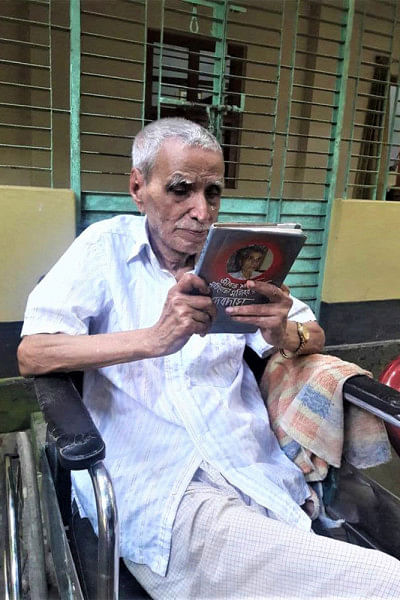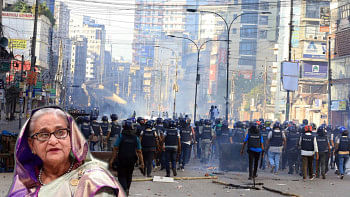Courage, thy name is Devdas

Recently, Mujibor Rahman Devdas passed away. Although the state honoured him with the Ekushey Padak, he had to lead his life in isolation and remained totally unknown to many people. At this time of immersion in the various lures of the consumer society, do many people show an interest in knowing about the torments people suffered during the Liberation War? Do contemporary citizens bother to think of their countrymen who sacrificed their present in 1971 for the future of many others?
Mujibor Rahman started teaching with a brilliant academic background. He stood second in the merit list in the HSC examinations and obtained a Masters' degree in Mathematics from the University of Dhaka, securing first position in first class. Later, he studied Mathematics at the University of Melbourne. In 1971, he was a Senior Lecturer in the Department of Mathematics in Rajshahi University. After the military crackdown on March 25, Rajshahi University turned into a Pakistani concentration camp and slaughterhouse. Hundreds of Bengalis were interrogated, tortured and murdered in certain buildings of the university. At that time, Nazim Mahmud was a public relations officer in Rajshahi University. His memoir Jokhon Kreetodash: Smriti 71 depicts those days of horror, humiliation and heartbreak in the Rajshahi University campus.
In those grim months at Rajshahi University, pro-liberation professors were taken from their residences by the Pakistani army for questioning. Some of them returned, and some never did. Women and adolescent girls were raped by the Pakistani jawans, belongings of the teachers and officers were looted from their houses, and the decaying corpses of university peons were later found inside a building. University employees and people of the surrounding areas were taken to the army camp located in Shaheed Zoha Hall. Later, many of them were executed. After independence, various mass graves were discovered in the open area beside Shaheed Zoha Hall.
According to Nazim Mahmud's memoirs, some non-Bengali as well as Bengali teachers of Rajshahi University became collaborators of the Pakistani army. A Deputy Registrar used to help the Pakistani army to capture pro-liberation professors. Then Vice-Chancellor of Rajshahi University was known for his alleged leanings toward the Pakistani authorities. Suspecting that Nazim Mahmud was not a supporter of the Pakistani establishment, the Pakistani army ordered the bank to freeze his account. A very anxious Nazim Mahmud sought help of the Vice-Chancellor, who was also his teacher at the University of Dhaka. However, instead of reassuring his former student, he advised that if the Pakistani soldiers intend to shoot Nazim Mahmud, he should request them to fire the gun at the middle of his forehead. Then the death would be absolutely painless.
In this petrifying situation, the pro-liberation people in the Rajshahi University campus became very apprehensive. Teachers and officers used to greet the Pakistani jawans very cordially. At a time when it was unthinkable for anyone residing on campus to defy the dominance of the Pakistani army, a letter from Senior Lecturer Mujibor Rahman, sent to the University Registrar on May 10, 1971, stunned everyone. In this letter, Mujibor Rahman stated his opinions clearly: "This is to inform the authority that I am going to leave the campus since the university campus has, at the moment, been degraded to the state of military camp. I may come to the campus when the university regains its status of sanctity and starts functioning as a university in its true sense… I hope to be kept informed about the situation here in the address noted below, where I hope to spend these days of calamity, genocide and restricted freedom of movement. Please note the change of my name and my new name should be used in future communications."
He signed the letter using his new name—Devdas. When everyone was trying to prove themselves to be good Muslims in order to please the Pakistani army, Mujibor Rahman's act of changing his Muslim name indicated his anger against the ideology of the Pakistani army. Soon, the army was informed of this letter and the pro-Pakistani Deputy Registrar took the army to the residence of this rebellious teacher. Mujibor Rahman introduced himself as Devdas. The army captain asked him what he meant by genocide in his letter. "That which you are committing these days," he replied. He was arrested right away. Nazim Mahmud wrote in his memoirs that later, in front of the administration building, he saw Devdas sitting quietly alongside the captain inside the army vehicle. There was no sign of fear or anxiety on his face.
We don't know what treatment Devdas received from the Pakistani army in the following days, but the incarceration took a heavy toll on him. In September, he was released from jail and he was suffering from a psychiatric disorder at the time. After independence, he did not get the official approval to resume his work at Rajshahi University. In 1971, when many teachers and officers acted differently in order to save their lives, Mujibor Rahman refused to accept dishonour. In spite of living within the clutches of the Pakistani army, he condemned their aggression and genocide. Putting his life at risk, he denounced the degradation of the university to a military camp.
If such a person, with astonishing courage and moral fibre, was in need of medical care in independent Bangladesh, wasn't it expected that the university authorities would arrange for his medical treatment? Unfortunately, Mujibor Rahman did not receive importance in the new country. Out of frustration, he resigned from the university and went to his native village in Joypurhat where he spent the rest of his life. After several years, Rajshahi University organised a programme to honour him. At that time, after visiting a museum, he wrote in the comment book: "Visited the museum on August 10, 1998. I hope history will be able to overcome the distortion of facts depicted through pictures here."
A documentary titled Aami Kaan Pete Roi by Mofidul Hoque depicts how Mujibor Rahman led a dismal life in his village. He hardly talked to his family members and most of the time, he used to sit alone morosely. In 1971, he did not put up with the crimes committed by the Pakistani army and their local collaborators. By showing extraordinary courage, he set a remarkable example of deploring Pakistani military brutality. The Pakistani army could not defeat him. But we failed him in independent Bangladesh by relegating him to oblivion. When we still witness unjust acts, and conformity to the ideas of the powerful becomes commonplace, it is important to remember a person like him. Let us do so in days to come because the fearless protest of Mujibor Rahman Devdas can inspire people to oppose and denunciate injustice without showing fear.
Dr Naadir Junaid is Professor, Department of Mass Communication and Journalism, University of Dhaka.

 For all latest news, follow The Daily Star's Google News channel.
For all latest news, follow The Daily Star's Google News channel. 



Comments